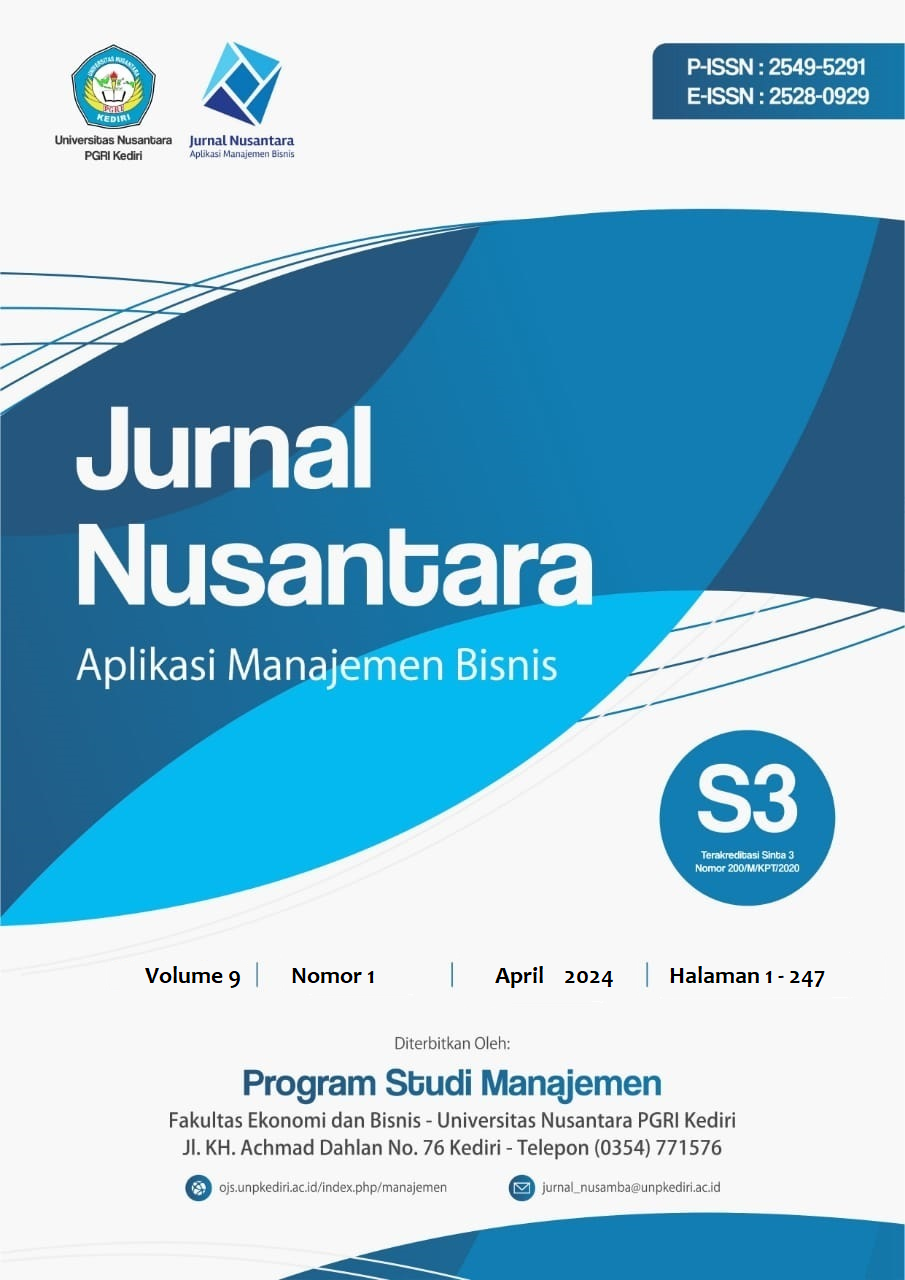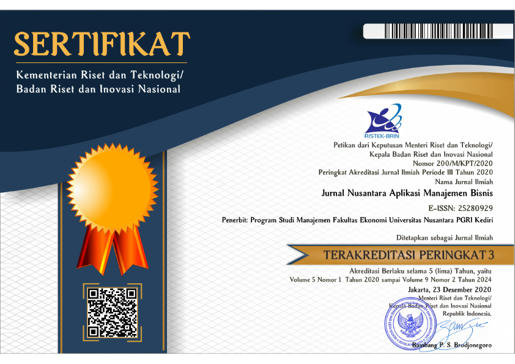Analisis Anteseden E-Money Adoption pada Masyarakat di Kota Batam
DOI:
https://doi.org/10.29407/nusamba.v9i1.20173Keywords:
Ease of Use, Performance Expectancy, Habit, Covid-19 Risk, Behaviour IntentionAbstract
Research aim: This study intends to determine the intensity of people's behavior in using electronic money.
Design/Approach: This study was designed with a survey research model.
Research Finding: The study's outcome indicates that ease of use, performance risk expectations, habits, and COVID-19 risk had a significant positive effect on the actual use of e-money with behavioral intensity as mediation.
Theoretical contribution/Originality: This research shows that the use of e-money increased during pandemics.
Practitioner/Policy implication: This research can be useful for the e-money platform as material for R&D to provide expansion and improvement of the business side of the e-money company.
Research limitation: This research solely centered on several variables, i.e. ease of use, performance risk expectations, habits, and Covid-19 risk.
Downloads
References
Farida N, Ardyan E, Nuryakin N. Gender differences in interest in using electronic money: An application of theory planned behavior. Int Rev Manag Mark 2016;6:898–903.
Annur CM. Penduduk Indonesia Tembus 278 Juta Jiwa hingga Pertengahan 2023. 2023.
SKNI. Gerakan Nasional Nontunai. 2018.
Ipsos. Ipsos Marketing Summit “ Indonesia The Next Cashless Society.” 2020.
Statistik BP. Total Penduduk Indonesia 2023.
Ramadan R, Aita J. A model of mobile payment usage among Arab consumers. Int J Bank Mark 2018;36:1213–34. https://doi.org/10.1108/IJBM-05-2017-0080.
Alswaigh NY, Aloud ME. Factors Affecting User Adoption of E-Payment Services Available in Mobile Wallets in Saudi Arabia. IJCSNS Int J Comput Sci Netw Secur 2021;21:222.
Im I, Hong S, Kang MS. An international comparison of technology adoption: Testing the UTAUT model. Inf Manag 2011;48:1–8. https://doi.org/10.1016/j.im.2010.09.001.
Putra P, Jayadi R, Steven I. The Impact of Quality and Price on the Loyalty of Electronic Money Users: Empirical Evidence from Indonesia. J Asian Financ Econ Bus 2021;8:1349–59. https://doi.org/10.13106/jafeb.2021.vol8.no3.1349.
Aji HM, Berakon I, Riza AF. The effects of subjective norm and knowledge about riba on intention to use e-money in Indonesia. J Islam Mark 2020;12:1180–96. https://doi.org/10.1108/JIMA-10-2019-0203.
Hair JF, Sarstedt M, Hopkins L, Kuppelwieser VG. Partial least squares structural equation modeling (PLS-SEM): An emerging tool in business research. Eur Bus Rev 2014;26:106–21. https://doi.org/10.1108/EBR-10-2013-0128.
Chaveesuk S, Vanitchatchavan P, Wutthirong P, Nakwari P, Jaikua M, Chaiyasoonthorn W. The acceptance model toward cashless society in Thailand. ACM Int Conf Proceeding Ser 2019:190–5. https://doi.org/10.1145/3357419.3357457.
Rahardjo B, Akbar BMB, Novitaningtyas I. The Analysis of Intention and Use of Financial Technology. J Account Strateg Financ 2020;3:88–102. https://doi.org/10.33005/jasf.v3i1.70.
Yang M, Al Mamun A, Mohiuddin M, Nawi NC, Zainol NR. Cashless transactions: A study on intention and adoption of e-wallets. Sustain 2021;13:1–18. https://doi.org/10.3390/su13020831.
Venkatesh J, Thong X. of Acceptance and Use of Technology1 2012;36:157–78.
Riskinanto A, Kelana B, Hilmawan DR. The Moderation Effect of Age on Adopting E-Payment Technology. Procedia Comput Sci 2017;124:536–43. https://doi.org/10.1016/j.procs.2017.12.187.
Susanto P, Hoque ME, Hashim NMHN, Shah NU, Alam MNA. Moderating effects of perceived risk on the determinants–outcome nexus of e-money behaviour. Int J Emerg Mark 2022;17:530–49. https://doi.org/10.1108/IJOEM-05-2019-0382.
Alfansi L, Daulay MYI. Factor affecting the use of e-money in millennial generation: Research model UTAUT 2. J Manaj Dan Pemasar Jasa 2021;14:109–22. https://doi.org/10.25105/jmpj.v14i1.8212.
Anggraeni FD, Rabiyah U, Pontoh GT, Mediaty M, Sundari S. Analysis of E-Wallet Using Intentions Among Millenial Generation. J Int Conf Proc 2021;4. https://doi.org/10.32535/jicp.v4i2.1433.
Daragmeh A, Lentner C, Sági J. FinTech payments in the era of COVID-19: Factors influencing behavioral intentions of “Generation X” in Hungary to use mobile payment. J Behav Exp Financ 2021;32:100574. https://doi.org/10.1016/j.jbef.2021.100574.
Rahayu S, Hariadi S. Intention to use E-wallet during the COVID-19 pandemic in Indonesia. Contemp Res Manag Bus 2022:232–5. https://doi.org/10.1201/9781003295952-59.
Monica F, Japarianto E. Analisa Pengaruh Perceived Ease of Use Dan Melalui Perceived Enjoyment Terhadap Behavior Intention Pada Digital Payment. J Manaj Pemasar 2022;16:9–15. https://doi.org/10.9744/pemasaran.16.1.9-15.
Indah M, Agustin H. Penerapan Model Utaut (Unified Theory Of Acceptance And Use Of Technology) Untuk Memahami Niat Dan Perilaku Aktual Pengguna Go-Pay Di Kota Padang. J Eksplor Akunt 2019;1:1949–67. https://doi.org/10.24036/jea.v1i4.188.
Kurniawan AT, Endahjati S. Faktor yang Mempengaruhi Keberterimaan Penggunaan Uang Digital di Masyarakat Kota Yogyakarta. J Akunt Keuang Dan Bisnis 2020;13:1–10.
Rahmawati RE, Maika MR. Penerapan Model UTAUT terkait akseptasi mahasiswa terhadap Cashless Payment di masa Pandemi COVID-19. J Ekon Mod 2021;17:1–14. https://doi.org/10.21067/jem.v17i1.5228.
Downloads
Published
Issue
Section
License
Authors who publish with this journal agree to the following terms:
- Copyright on any article is retained by the author(s).
- The author grants the journal, the right of first publication with the work simultaneously licensed under a Creative Commons Attribution License that allows others to share the work with an acknowledgment of the work’s authorship and initial publication in this journal.
- Authors are able to enter into separate, additional contractual arrangements for the non-exclusive distribution of the journal’s published version of the work (e.g., post it to an institutional repository or publish it in a book), with an acknowledgment of its initial publication in this journal.
- Authors are permitted and encouraged to post their work online (e.g., in institutional repositories or on their website) prior to and during the submission process, as it can lead to productive exchanges, as well as earlier and greater citation of published work.
- The article and any associated published material is distributed under the Creative Commons Attribution-ShareAlike 4.0 International License












